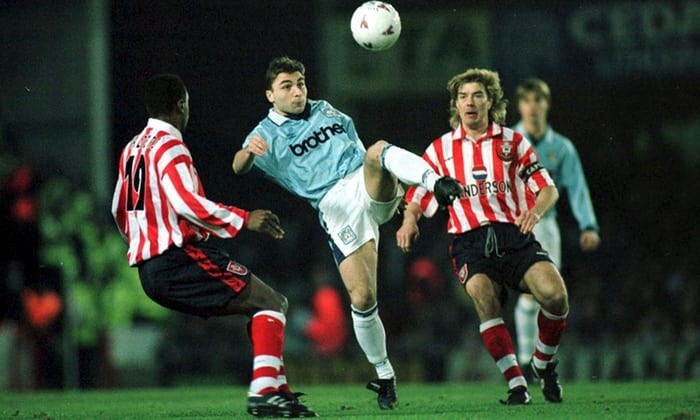There was recently a set of tweets that went somewhat viral on 'football Twitter', from a Chelsea fan arguing the case that Gianfranco Zola was not half the club legend that Eden Hazard is.
After all, he won fewer trophies - collective and individual - and played before Roman Abramovich set foot in Stamford Bridge for the first time as owner, a period in the club's history of which it is fair to say many fans know little.
The argument itself is moot. Comparing across eras like that is never likely to bring about any meaningful findings, and serves only to promote the generational divide which splits many club fanbases.
What is more important to take from the incident is that when a club like Chelsea is transformed in such a way, it is easy for club heroes from darker times to be swept by the wayside.
Who needs Peter Bonetti, Tommy Lawton and Bobby Tambling when you have Petr Čech, Didier Drogba and Frank Lampard, after all? The former are old men, simply half-recognised names on the pages of those fanzines that people used to read.
But these names and these histories make up the fabric of a football club, shape bits of it in their own identity whether new fans are aware of it or not.
Manchester City fans would do well to avoid this trap as Pep Guardiola attempts to finally establish them at the top table of football's elite. For at least one generation of City fans - or, as they may one day come to be known, Cityzens - there is one name that should never be replaced by an Agüero, Touré, or any number of Silvas.
That man was Georgi Kinkladze.
An unrecognisable Manchester City
When the diminutive Georgian joined the Sky Blues in 1995, they were not a small club. They had league titles, FA Cups, even a European Cup Winners' Cup to their name, but nor where they a traditional big side. They had had some success in their past but to many, they were the Manchester side that wasn't United.
And, on the face of it, Kinkladze wasn't that interesting a signing. Sure, he had an excellent goalscoring record for a midfielder, but that was in Georgia. Mretebi Tbilisi and Dinamo Tbilili are hardly household names, and his time on loan in Germany with 1. FC Saarbrücken and Argentina with Boca Juniors had been largely unsuccessful.
Again, at a glance, his time at City wasn't all that successful either. He was only there for three seasons, and City were relegated twice in that time. Manager Joe Royle thought that the 'cult of Kinkladze' had played a significant role in this downfall.
But, one grim Saturday in March 1996, Kinkladze scored the goal that would be eponymous with his time at the club. Part way through their relegation season from the top flight, in a win against a rival that would prove to not quite be enough - but boy, was it brilliant.
A goal to rival any by Messi
City are already 1-0 up against Southampton thanks to an earlier Kinkladze tap-in, but with eight minutes of the first half remaining, he picks up the ball from Steve Lomas, way out on the right wing.
What followed was one of those goals that started seeming a little ordinary once Lionel Messi started doing it every other week, but is beyond the abilities of most human footballers.
He moves the ball inside, skipping away from one defender and holding him off as he barrels towards goal, evading the covering run of another as he reaches the edge of the area.
Finally shaking off the grappling tug of the first defender as he bursts into the box, two more defenders converge on him from each side, delightfully criss-crossing past each other and the advancing playmaker like a pair of Red Arrows as he finds himself now through on goal with England keeper Dave Beasant.
"This would be a fantastic goal," screams the commentator but he doesn't have time to finish his thought. Kinkladze has already feinted a shot, put the goalkeeper on his backside and lobbed the ball gently over him into the near corner.
It was his second goal in five minutes, and enough for City to take three precious points in a miserable season.
It wasn't the first incredible thing he had done in a blue shirt and it certainly wouldn't be the last. Turning down the advances of Barcelona, Inter Milan, Liverpool and Celtic after City's first relegation was as incredible as anything he did on the pitch, and one of the main reasons he was so loved.
A different hero for a different age
It's the sort of thing that, with danger of ageing forty years in the space of a sentence, the young Argentinian fan who support City because his favourite player Sergio Agüero plays for them, probably won't quite understand. And that's fine.
For better or worse, City are now a truly international football club with international aspirations and a young, international fanbase.
These new fans support the club because the club is successful, atop a high perch from which it is difficult to see the club falling any time soon. There is nothing wrong with that - each to their own.
But if Manchester City do win the Champions League in the next few years, if they establish themselves as English football's dominant force, there will always be some fans who feel a strange longing for the bad old days.
The dazzling lights at the top of the game have their allure, but once upon a time City was a club battling through the dark. But even then, one shining light was enough.
-
This is part of a regular feature series, 'The A-Z of Forgotten Football Heroes'. Check out the last entry on Josimar, a Brazilian star who burned brightly but all too briefly, here.









































